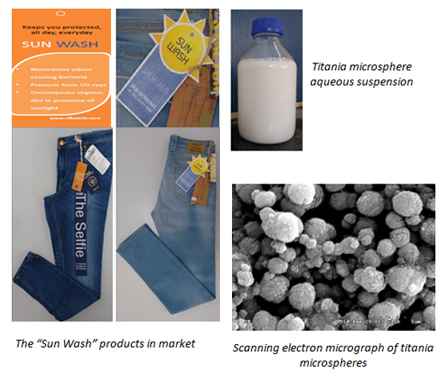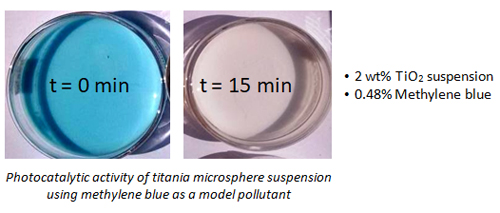 Wear the ‘Sun Wash’ jean pant and contribute to conserve energy, save water, breath fresh, and reduce pollution! No surprise! Nanotechnology is at work! A ‘Self Cleaning’ and ‘UV protection’ technology developed by a team at the International Advanced Research Centre for Powder Metallurgy & New Materials (ARCI), an autonomous R&D Centre of Department of Science and Technology, Govt. of India, can do such wonders!
Wear the ‘Sun Wash’ jean pant and contribute to conserve energy, save water, breath fresh, and reduce pollution! No surprise! Nanotechnology is at work! A ‘Self Cleaning’ and ‘UV protection’ technology developed by a team at the International Advanced Research Centre for Powder Metallurgy & New Materials (ARCI), an autonomous R&D Centre of Department of Science and Technology, Govt. of India, can do such wonders!A novel titanium-dioxide based material has been developed at ARCI, Hyderabad for self-cleaning application. It is ‘Self Cleaning’ and can clean the organic pollutants and microorganisms just by giving sunlight exposure for a few hours. The technology has been transferred to Bengaluru based industry for its application on textiles and commercialization, and the ‘Self Cleaning’ garments have been launched in the market under tag ‘Sun Wash’ and ‘Wearable Sun Screen.’
The ‘self-cleaning’ technology works on the principle of photocatalysis, in which the active photocatalyst Titanium dioxide absorbs the photons of a certain wavelength in the sunlight, which leads to an excitation of electrons in the molecule to higher energy state leaving behind positive holes at lower energy level. These photo-induced excited electrons and holes take part in the reduction and oxidation process, respectively, and can degrade most of the organic pollutants and microorganisms in its contact, keeping the surface clean. The ‘self-cleaning’ technology for textiles can save water, detergent, and electricity.
ARCI and Resil Chemicals, a Bengaluru based Private company, worked together to bring this technology to the market. ‘Self-cleaning’ textiles are the first of its kind product commercialized in our country and abroad.
The product developed at ARCI is in the form of suspension of Titanium dioxide or titania microspheres in water. The particles are micrometer in size but possess all the special properties due to the nanometer scale and are specially designed by bandgap and surface engineering.
 The titania microspheres were surface modified by a small concentration of ultrafine silver nanoparticles. The silver nanoparticles enhance the photocatalytic activity by acting as an electron sink, which in turn enhances the number of electron-hole pairs available for redox reactions. It also acts as an antibacterial agent in either presence or absence of sunlight. This special design of the titania microspheres drastically minimizes any risk related to nanotoxicology and still provides all the benefits of nano-size, which makes it safe for manufacturing, processing, handling, and usage. The major rutile titania (a form of titanium dioxide) present in it makes the product efficient as a UV light absorber and visible light reflector, which adds the functionality of UV protection and surface brightening.
The titania microspheres were surface modified by a small concentration of ultrafine silver nanoparticles. The silver nanoparticles enhance the photocatalytic activity by acting as an electron sink, which in turn enhances the number of electron-hole pairs available for redox reactions. It also acts as an antibacterial agent in either presence or absence of sunlight. This special design of the titania microspheres drastically minimizes any risk related to nanotoxicology and still provides all the benefits of nano-size, which makes it safe for manufacturing, processing, handling, and usage. The major rutile titania (a form of titanium dioxide) present in it makes the product efficient as a UV light absorber and visible light reflector, which adds the functionality of UV protection and surface brightening.Two Indian patents IP 282988, IP 291408 have been granted to ARCI, and one patent with application number is3777/DEL/2014 is pending.
"DST's National Nanomission in the past two decades has created significant infrastructure, human resources, and extraordinary knowledge base in this globally competitive area. There is now increasing emphasis on and understanding of nanotech innovations reaching the market," said Prof Ashutosh Sharma, Secretary, DST.
For more details contact Dr. Neha Y Hebalkar (neha[at]arci[dot]res[dot]in)






























